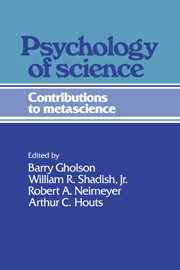Book contents
- Frontmatter
- Contents
- Preface
- Contributors
- 1 The psychology of science: An introduction
- Part I Historical issues in the psychology of science
- Part II The case for a psychology of science
- Part III Creativity and the psychology of science
- Part IV Cognition in the psychology of science
- Part V Social factors in the psychology of science
- 14 The psychology of scientific dialogues
- 15 The perception and evaluation of quality in science
- Part VI Epilogue and Prologue
- Author index
- Subject index
15 - The perception and evaluation of quality in science
Published online by Cambridge University Press: 05 June 2012
- Frontmatter
- Contents
- Preface
- Contributors
- 1 The psychology of science: An introduction
- Part I Historical issues in the psychology of science
- Part II The case for a psychology of science
- Part III Creativity and the psychology of science
- Part IV Cognition in the psychology of science
- Part V Social factors in the psychology of science
- 14 The psychology of scientific dialogues
- 15 The perception and evaluation of quality in science
- Part VI Epilogue and Prologue
- Author index
- Subject index
Summary
One goal of all science studies, including the psychology of science, is to improve the quality of science. This goal is presupposed in philosophical discussions of progress in science (Lakatos, 1978; Laudan, 1977), because science that “progresses” is presumably a more worthwhile pursuit than science that does not. Such a goal is also implied by efforts to develop specific indicators of the process and outcome of science (Holton, 1982). Such indicators are demonstrably of interest to those who want to determine the worth of their investment in science.
Assessing the quality of science and suggesting changes that might improve science are tasks for science evaluation. In this chapter, I would like to make three contributions to the latter topic. Starting at the broadest conceptual level, I will explicate in some detail the nature of science evaluation, providing a framework within which the mechanics of evaluation can be considered, and some indications of the forms that it might take in practice. Narrowing the focus somewhat, I will then briefly suggest some contributions that psychology might make to science evaluation. I will then close at the most concrete level, presenting three brief empirical studies that illustrate these psychological contributions.
Science evaluation
Science studies used to consist of just two topics, the philosophy and the history of science. Beginning in the 1940s, the sociology of science joined in the effort (Collins, 1983; Mulkay, 1980). Today, the number of disciplines studying the operations and consequences of science is rapidly proliferating, and includes economics, anthropology, and political science, as well (Ziman, 1984).
- Type
- Chapter
- Information
- Psychology of ScienceContributions to Metascience, pp. 383 - 426Publisher: Cambridge University PressPrint publication year: 1989
- 28
- Cited by



